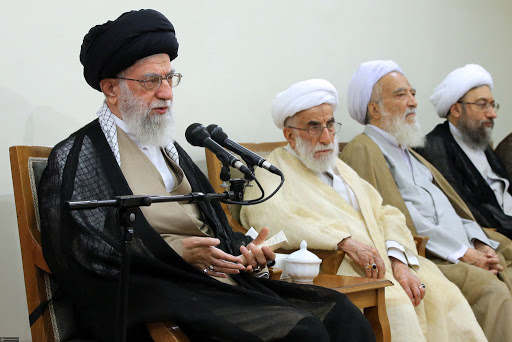OPINION: Why Iran’s anti-Israel rhetoric is mere bluster
by Dr. Majid Rafizadeh
They enjoy getting engaged in vitriolic exchanges with Israel in order to show their loyalty to the revolutionary principles of the theocratic establishment…
Tensions between Israel and Iran have been escalating amid the coronavirus disease pandemic. The heightened tensions are in danger of spiraling out of control and leading to a war between the two rivals, who were once staunch allies during the Tehran regime of Shah Mohammed Reza Pahlavi.
Last week, Iran’s state-controlled media outlets and politicians specifically targeted Israel. Supreme Leader Ali Khamenei called Israel a “cancerous tumor” that “will undoubtedly be uprooted and destroyed.” He compared Israel to a virus that needs to be eliminated.
Iran’s so-called moderate politicians also pursued a similar hard-line path by lashing out at Israel. Foreign Minister Mohammed Javad Zarif took to Twitter and used a euphemism that was previously used by Nazi Germany’s leaders. He stated: “Disgusting that those whose civilization found a ‘Final Solution’ in gas chambers attack those who seek a real solution at the ballot box, through a REFERENDUM. Why are US and West so afraid of democracy? Palestinians should not have to pay for your crimes, or for your guilt.” He also posted a controversial image containing the wording: “The final solution: Resistance until referendum.”
Tensions appeared to escalate further as Israel forcefully responded, warning Tehran and comparing the line used by the Iranian regime to that of the Nazis. Israeli Prime Minister Benjamin Netanyahu tweeted: “Khamenei’s threats to realize the ‘final solution’ against Israel are reminiscent of the Nazi ‘final solution’ plan for the destruction of the Jewish people. He must know that any regime that threatens Israel with extermination will find itself in similar danger.”
Any potential war between Israel and Iran will significantly destabilize the volatile region and most likely drag in global powers such as the US and Russia. That is why US officials immediately reacted by supporting Israel, with Secretary of State Mike Pompeo accusing Zarif of “echoing Hitler’s call for genocide.” He added on Twitter: “This depravity should dispel any notion the regime belongs in the community of nations. We stand with Germany and Israel against this oldest & most vile form of hatred, and say #NeverAgain.”
It is important to point out that the Iranian leaders’ threats against Israel are merely superheated rhetoric and empty words. They enjoy getting engaged in vitriolic exchanges with Israel in order to show their loyalty to the revolutionary principles of the theocratic establishment, as well as to appease their hard-line base and militias.
In addition, such exchanges give the Iranian leaders the opportunity to deflect attention from the current domestic woes they are facing. After easing lockdown restrictions, Iran is seeing a new surge in coronavirus cases. And more than 10,000 health care workers have been infected in the country, according to reports.
The regime has failed to cover up its mishandling of the public health crisis and the people’s frustration and anger toward the ruling clerics have been escalating as a result. The regime initially failed to take appropriate measures and downplayed the severity of the situation. For instance, while many countries suspended flights to China when coronavirus cases began emerging there, the Iranian regime continued its flights. Even some of Iran’s state-controlled news outlets began reporting on the issue and criticizing the airlines, including Mahan Air.
The regime is also attempting to deflect attention from the crippling economic situation it is encountering. In 2018, Iran’s economy contracted by about 4.8 percent, followed by a 9.5 percent drop last year. Meanwhile, unemployment and inflation have skyrocketed and the national currency continues to lose its value. The one-year rate of inflation for households hit 40 percent in 2019, while the authorities are cutting subsidies. Desperate for cash, not only did the regime cut petrol subsidies, it also hiked the price of fuel by almost 50 percent, putting significant financial pressure on ordinary people.
Finally, another sign that the regime’s anti-Israel threats are more likely to be baseless rhetoric is its military inaction and silence in the face of Tel Aviv’s repeated attacks on Iranian military bases in Syria and Iraq. The Israel Defense Forces has struck dozens of Iranian targets in Syria — including at the beginning of this month — and carried out a series of airstrikes in northern Baghdad, but Tehran has not responded militarily.
The Iranian authorities must halt their anti-Israel rhetoric, as it could spiral out of control and lead to a perilous war in the Middle East.
Article first published on Arab News.
Dr. Majid Rafizadeh is a Harvard-educated Iranian-American political scientist. He tweets under @Dr_Rafizadeh.



